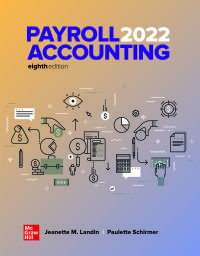Question
Steven died on December 31, 2015, owning a home in New York worth $400,000, a car worth $20,000, stocks worth $1,000,000, bank accounts containing $50,000,
Steven died on December 31, 2015, owning a home in New York worth $400,000, a car worth $20,000, stocks worth $1,000,000, bank accounts containing $50,000, and household furnishings and personal effects valued at $30,000. Steven also owned a life insurance policy that paid $500,000 to Lauren. Steven also owned a summer home with his sister, Patricia, as joint tenants with the right of survivorship. The house had a fair market value of $200,000. Steven and Patricia each paid 50% for the purchase of the home but due to a fire, lost any proof that would show the amount contributed by either Steven or Patricia. Steven had established a revocable trust in 1995 with the Friendly National Bank as Trustee to pay the income to Steven during his life and the principal to Lauren at his death. The value of the property placed in trust was $2,500,000. The value of trust principal at the date of Stevens death was $3,300,000. Steven was a named beneficiary of an irrevocable trust established by his grandfather that provided Steven income for his life. Steven was also the trustee of his grandfathers trust and he had the power to distribute money to other beneficiaries only. At the time of his death, this trust had a value of $2,500,000.
Steven was married to Jill and his only child was Lauren.
In March 2016, the real estate market crashed and the New York home Steven owned was now worth $200,000 and the summer home was now worth $100,000.
Stevens will specifically provided that his executor, his brother Bobby, was to pay the expenses of his last illness, his debts, and funeral expenses. Stevens will left 50% of his estate to his wife Jill and the other 50% to his daughter Lauren.
Bobby as executor incurred the following expenses for Stevens burial: $20,000 to the Ridgewood Cemetery Funeral Services Inc. that included the cost of the casket, the hearse, a limousine for the family, and the funeral director.
For Stevens last illness Bobby paid the medical bills that were not covered by insurance totaling $85,000. At the time of his death, Steven still owed $15,000 on a car finance. He also had outstanding a personal note for $20,000, and miscellaneous bills totaling $25,000. Bobby paid court costs of $2,000, accountants fees of $18,000, and appraisers fees of $10,000. Executors fees were $30,000. Attorneys fees to probate the estate were $25,000.
Bobby also paid the federal and state income tax of $85,000 due on Stevens 2015 income. Bobby, as executor, also paid the state estate taxes due totaling $450,000.
Steven made gifts to Lauren equal to the amount of the gift tax annual exclusion each year in the five years preceding his death. Assume for purposes of this question that the annual gift tax exclusion for each year was $14,000. Immediately after making each gift, Steven borrowed the amount of the gift from Lauren. Each loan was evidenced by a promissory note, payable on demand, and bearing interest at 10% on the original principal amount. Steven had not made any payments against the loans or interest at the time of his death. Lauren presented these notes to Bobby for payment as claims against the estate.
In 2014, Steven made the following gifts:
Steven gave his daughter Lauren a fur coat worth $6,000 that he purchased for $10,000
Steven gave his sister Patricia a car worth $18,000 that he purchased for $10,000
Steven gave his friend Matthew $20,000 in cash
Steven timely filed Form 706 in 2015. This was the first year Steven was required to file a gift tax return in his life.
Questions
a.What was Stevens gift tax liability in 2014 prior to the application of the unified credit? Assume that gift tax rate is 50%.
b.What is the value of Stevens gross estate? To get full credit, you should fully explain your answer and if you believe any property should not be included in Stevens gross estate, explain why.
C. Given real estate market crash, can Stevens estate elect to use the alternate valuation date to value the assets in his gross estate? Why or why?
D. What is the value of Stevens taxable estate? Why?
Step by Step Solution
There are 3 Steps involved in it
Step: 1

Get Instant Access to Expert-Tailored Solutions
See step-by-step solutions with expert insights and AI powered tools for academic success
Step: 2

Step: 3

Ace Your Homework with AI
Get the answers you need in no time with our AI-driven, step-by-step assistance
Get Started


